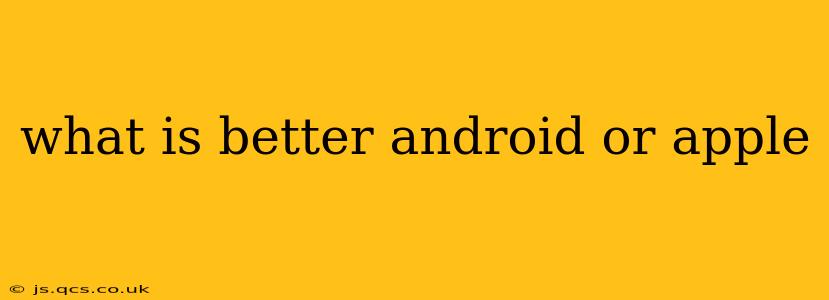Android vs. Apple: Which Operating System Reigns Supreme?
The age-old debate: Android vs. Apple. Choosing between these two mobile operating systems is a deeply personal decision, hinging on individual needs, preferences, and priorities. There's no single "better" option; the ideal choice depends entirely on what you value most in a smartphone. This comprehensive guide will delve into the key differences, helping you make an informed decision.
What are the main differences between Android and Apple?
This is a fundamental question, and the answer lies in several key areas: operating system philosophy, app ecosystems, customization options, hardware integration, and price points. Android, developed by Google, embraces open-source principles, fostering a diverse range of devices from various manufacturers at various price points. Apple, on the other hand, controls both the hardware and software, resulting in a tightly integrated and highly polished user experience, but with less flexibility and typically higher costs.
What are the pros and cons of Android?
Pros:
- Customization: Android's open-source nature allows for extensive customization. You can change launchers, widgets, and even the operating system's core functionality.
- Price Range: Android phones span a massive price spectrum, from budget-friendly options to high-end flagships, offering choices for every budget.
- Open Source: The open-source nature encourages innovation and faster adoption of new technologies.
- Variety of Hardware: The large number of manufacturers producing Android devices provides a wide array of choices in terms of design, features, and size.
Cons:
- Fragmentation: The vast array of devices and manufacturers can lead to inconsistencies in software updates and feature availability.
- Bloatware: Some pre-installed apps on certain Android phones can consume storage space and resources.
- Security Concerns: While Android security has improved significantly, the open nature can make it more susceptible to malware compared to the tightly controlled Apple ecosystem.
What are the pros and cons of Apple?
Pros:
- Seamless Integration: The tight integration between hardware and software ensures a smooth, polished user experience.
- User-Friendly Interface: iOS is generally considered intuitive and easy to use, even for beginners.
- Strong App Ecosystem: The App Store offers a curated selection of high-quality apps, with a stringent review process that helps minimize malware.
- Regular Updates: Apple provides consistent software updates for several years, ensuring features and security patches remain up-to-date.
Cons:
- High Cost: Apple products typically command a premium price compared to Android devices with similar specifications.
- Limited Customization: Customization options are significantly restricted compared to Android.
- Less Openness: Apple's closed ecosystem limits the flexibility and control users have over their devices.
- Repair Costs: Repairing Apple devices can often be expensive.
Which operating system has better security?
Both Android and Apple prioritize security, but their approaches differ. Apple's tightly controlled ecosystem makes it more difficult for malware to penetrate, while Android's open nature requires more robust security measures from both Google and device manufacturers. However, both platforms continuously improve their security features, and choosing between them based solely on security is largely a matter of personal risk tolerance.
Which operating system has better apps?
Both Android and Apple boast vast app stores. While the App Store generally boasts a slightly higher concentration of high-quality apps, the Google Play Store offers a wider variety of apps, particularly in certain niche categories. The best app ecosystem for you will depend on which apps you frequently use.
Is Android better for gaming?
The gaming experience on both platforms is excellent, and the "better" choice depends on the specific games you play and your preferences. Android often offers greater hardware diversity, giving you choices across various price points and performance levels, but Apple's tighter integration and optimization can lead to a smoother experience for certain games.
Ultimately, the "better" operating system is subjective. Consider your priorities: Do you value customization and affordability? Choose Android. Do you prioritize a seamless, intuitive experience and a strong emphasis on security and app quality? Opt for Apple. Weighing the pros and cons carefully will help you make the right decision for your needs.
